“To travel is to live” – Hans Christian Andersen
Experiencing a new destination, whether locally or internationally, is probably one of the most exciting things you will ever do. From the dream phase when you’re still deciding which exotic destinations suit your budget (while still ticking all the boxes), to nabbing the most reasonable Travelstart flights hot off the shelves before they’re sold out. With all the excitement, we often overlook the slightly more arduous tasks like arranging your visa (yawn) or making sure you make it to the airport in ample time for your flight check-in. A frequently asked question is “How do you check in to a flight?” You’ll be surprised at how quickly time creeps up on you. Even frequent travellers often get this one wrong, causing them to miss their flights completely. There are a few tricks when it comes to the flight check-in process. We want to share these with you in order to make your holiday hassle-free from start to finish.
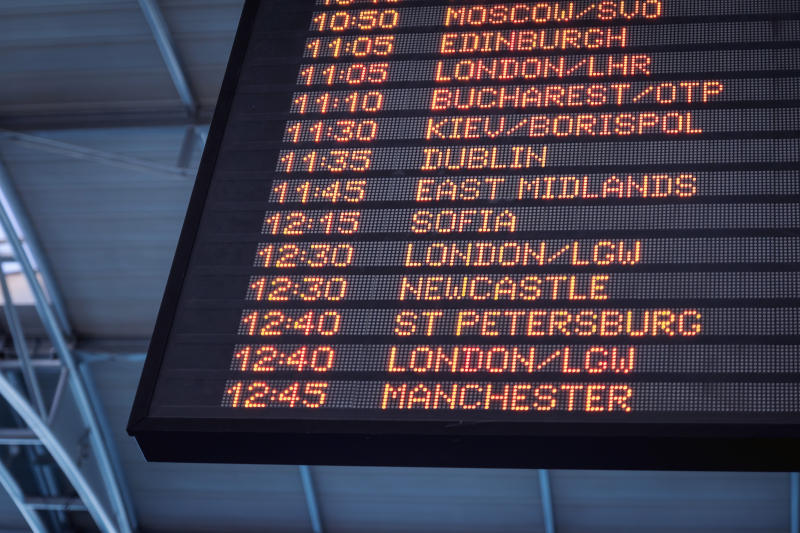
1. What does it mean to check in online for your flight?

Being able to check-in online is changing the way people travel. While not all airlines offer this service yet, it’s certainly a game changer. You can now do your flight check-in from the comfort of your home or on the go while you are going about your day. Here are a few reasons why we think you’ll benefit from an online flight check-in:
- Depending on the carrier, some airlines open online check-in as early as 48 hours or 24 hours before the flight and close up to 90 minutes before departure.
- Beat the mad rush to the airport. You can never predict unforeseen traffic.
- Book the seat you want before anyone else nabs it.
- On some carriers, you can even select your meal options and baggage quantities.
- Once your flight check-in is complete, remember to print out your boarding pass or get it from a self-service kiosk at the airport; depending on the airline.
See Travelstart’s online check-in guide to help you easily check-in for your upcoming trip.
2. How early do I have to be at the airport?

It is generally advised that travellers should be at the airport an hour before a domestic flight and two to three hours for an international flight. As a rule of thumb, we always say, the earlier the better. You can never be too early for a flight. For example, we would advise when travelling to the USA that you arrive at least three hours earlier for your flight as increased security checks are conducted. The standard opening times for flight check-in desks, however, are two hours before departure.
Always leave a bit of extra time for delays, especially if you are travelling during peak travel times like Friday evenings or Sunday mornings and over holiday periods.
If you are travelling with large quantities of luggage, you should try to get to the airport earlier than later, especially if you would like to wrap your luggage. Luggage weight problems can always cause a delay which can have a knock-on effect on everybody waiting to check in.
Checking in online may save you a bit of time but if you have luggage to put through, adhering to the advised time frames would be best. The good news is, the gates generally close 25 – 40 minutes before departure so if you have already checked in online, this might be your saving grace.
Perhaps it’s a good time to think about travel insurance or taking out cancellation protection. If any unforeseen circumstances happen while making your way to the airport, you would rather be safe than sorry.
3. Locate the correct terminal for your flight check-in

You will need to locate the departure terminal. Whether you are being dropped off at the airport or leaving your car at the airport, make sure you arrive at the correct terminal. Many of the larger international airports are quite expansive which can sometimes mean that terminals can be in different buildings. The last thing you want is to find out you are at the wrong terminal for your flight check-in and you now have to make your way to a totally different building. This can all be avoided by checking directly with the airline either online or by calling them before making your way to the airport.
4. Locate your airline check-in counter
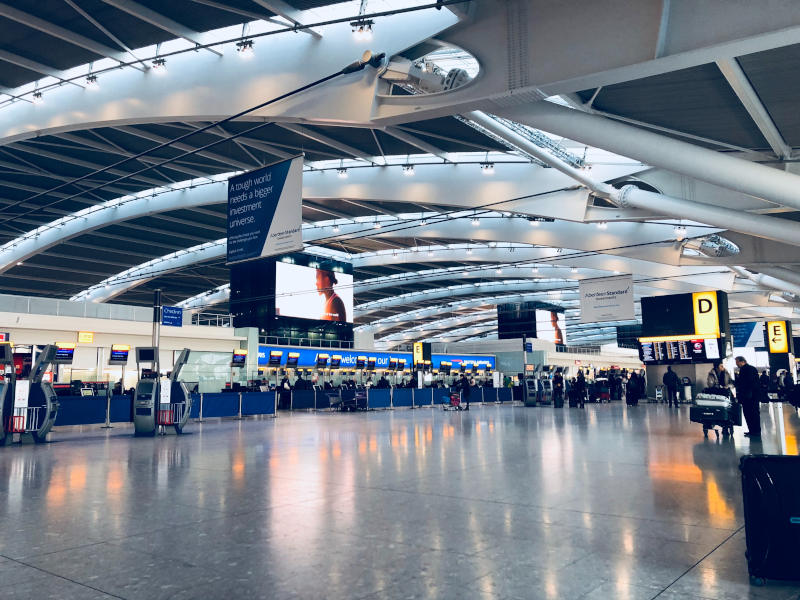
Make sure you know which airline you are flying with. Unfortunately, you cannot just check in at any airline check-in counter. Check your e-ticket or booking the night before your flight to avoid any confusion. You don’t want this to be the reason you miss your flight check-in. If you are unsure or struggling to find your airline check-in counter, ask an airport official – they would be happy to help you.
5. Check in your luggage
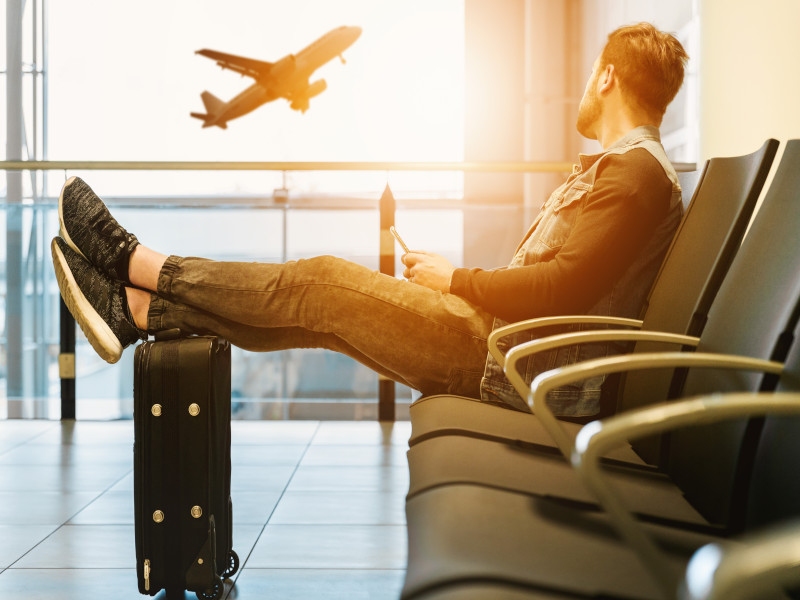
Whether it’s a domestic flight or an international flight, it’s important to know that all airlines have their own restrictions and rules around baggage allowance at the flight check-in counter.
- Most airlines will allow for 1 piece of hand luggage or carry-on luggage in addition to a laptop or handbag, and 1 or 2 pieces of luggage for the hold, but again this all depends on the airline.
- Some airlines use a piece concept, while others use a weight concept, meaning you can check in as many bags as you like, provided the total weight is within your limit. Make sure you know what your luggage restrictions are on Travelstart’s airlines guide.
- For shorter commutes, try to avoid carrying anything more than hand luggage and proceed to the shorter check-in counter where possible.
You might also be interested in lost baggage protection when booking your next flight.
6. Can I travel without a print out of an e-ticket?
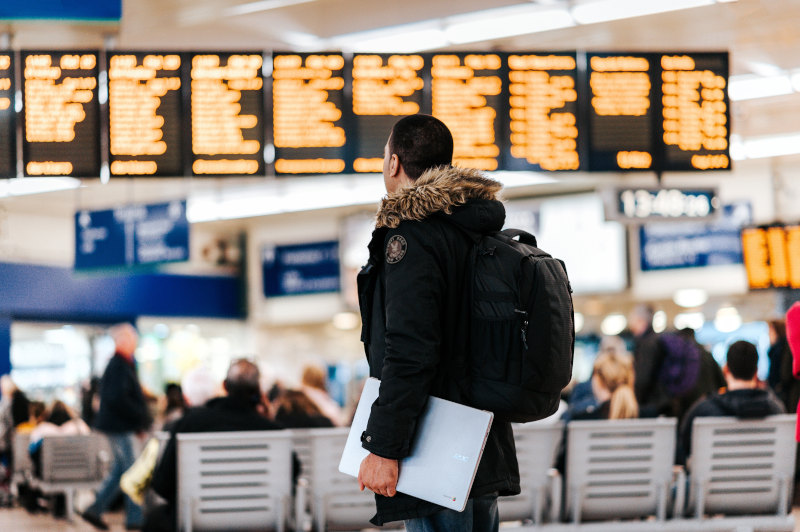
Traditionally, travellers would go to a travel agent and the travel agent would book the flight and then print out your travel itinerary for you or have it delivered to you at a later stage. Nowadays, with the rise of e-commerce, travellers can book their own tickets online.
As an example, once you have booked and paid for your trip on the Travelstart website, your e-ticket will be immediately sent to you via email. Your e-ticket will contain your flight booking reference, flight number and your ID/passport number. Some may print this e-ticket while others may simply just download it to their smartphones so they can just open it up on their phones and present it at the flight check-in counter. Since the entire booking process is now electronic, the agent at the check-in desk will be able to verify your booking as everything is already saved in a database. You will, however, need to carry your ID/passport and other required documents (if necessary) at all times in order for them to verify and print your boarding pass. As mentioned before, you cannot travel without a boarding pass.
7. You’ll need a boarding pass
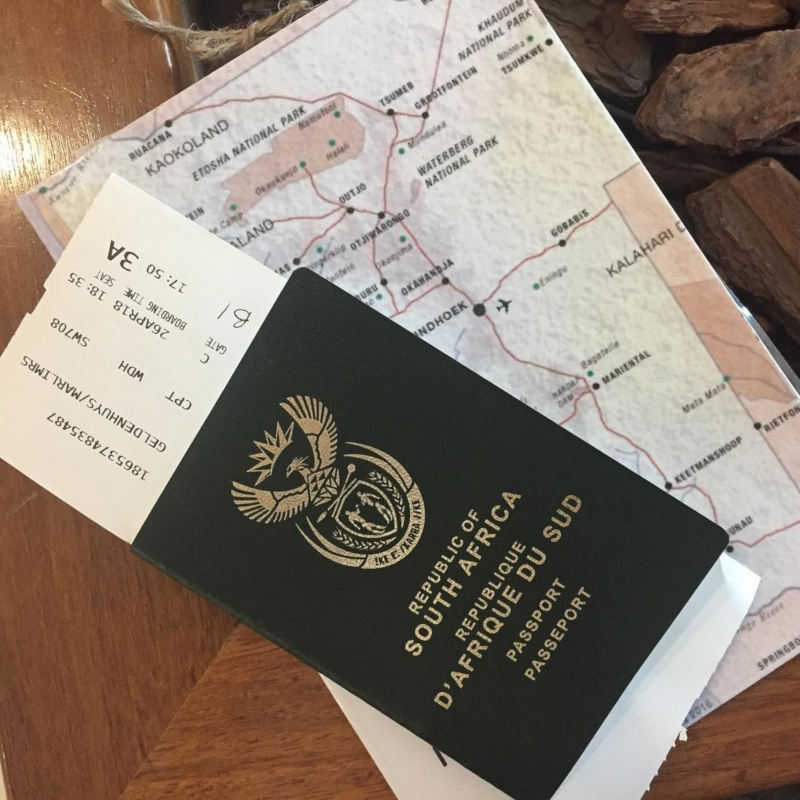
Your boarding pass is your ticket through to the departure lounge and onto the aeroplane. No boarding pass, no entry. There are a number of ways you can go about doing this actually and in fact, with the use of technology, it can be a lot easier and quicker than you think, especially if you don’t have any luggage to check in.
- Option 1: The traditional method of printing out your e-ticket and arriving at the check-in counter with your ID/passport and the credit card with which you purchased your ticket.
- Option 2: Check in at a self-check-in counter where all you need is the credit card with which you purchased the ticket, print your boarding pass and you are good to go.
- Option 3: Check in online and print the boarding pass before you arrive at the airport, or, save the boarding pass on your smartphone and use your smartphone as your boarding pass
You see, your flight check-in process can be really easy and very little hassle when executed properly. Ideally, you want to be able to check in with a bit of time to relax and unwind before your flight. Don’t forget to check what travel documents you might need if necessary for your international trip.
Let us know if you have any handy tips when it comes to a flight check-in. We’d love to get your feedback in the comments below.
Disclaimer:
All information on this blog page was correct at the time of publishing and may change at any time without prior notice. Travelstart will not be held liable for loss or inconvenience resulting from the use of out-dated or incorrectly noted information.






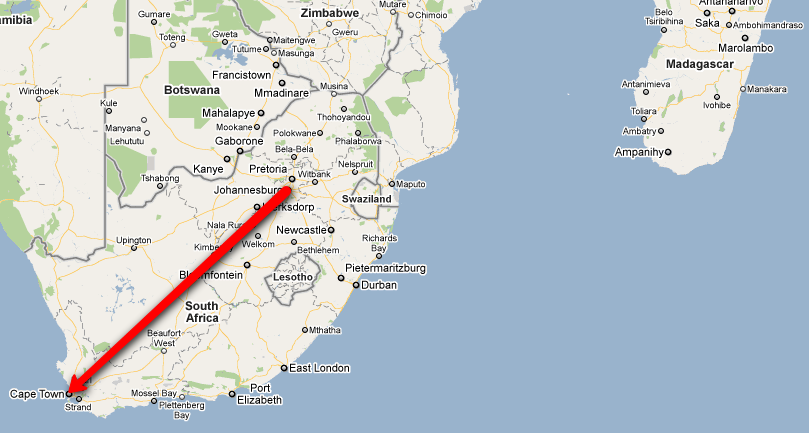
I am unable to check in on line for my flight Mango JE527 with the e-ticket number JE 9160039462012.
PLEASE ADVISE URGENTLY!!!!!
Hi Jennifer,
Sorry to hear you struggling to check-in.
Check-in can only be done 24 hours prior to departure on the airline website.
If you are in this time frame please try use the airline reference number and surname showing on the ticket.
Same like Jennifer. I used the Travelstart South African booking reference number and I have tried the six digit check-in reference number. No luck!!!
This is very frustrating!!
Hi Hendrik,
Sorry to hear you were struggling to locate your booking.
There could be a number of reasons why one would not be able to call up the booking.
1. Usually one is only able to call up their booking on the airlines website 24 hours prior to departure.
2. The PNR (passenger name record) was being used instead of the airline vendor locator (airline reference number)
3. Sometimes one mistaken the the number 0 for the letter O or letter l for capital I
You welcome to pop us an e-mail on feedback@travelstart.com and one of our agents will be happy to look into this and revert with feedback.
Apologies for any frustration caused and thanks for allowing us to look into this.
Flying to Sao Paulo on the 13th of October and unable to check in
Hi Ivor,
Sorry to hear you struggling to check-in.
The airlines only open up check-in 24 hours prior to departure. So if you are trying to check in around 7pm and your flight is only departing following day at 10pm they check-in would not have opened.
If you are checking in within the required time and still struggling the airlines site could be down or maybe the incorrect reference number is being used. Sometimes on mistakens the number 0 for the letter O or the letter l for number 1
I am trying to manage my booking and choose seats for our return from London to Durban. Our flight is tomorrow 18th. Please advise as soon as possible. Regards. Leslye BourneLange..flight ref ZA03884912
It is now 12.35am. We are travelling on Lufthansa tonight from OR Tambo. One of our passengers is over 90 years old and quite frail. The check-in system says we must enter 6 digits. Our reference is ZA05386251. Twelve digits!!
This old lady needs wheelchair assistance! The system will not accept our reference number and is causing great stress and anxiety.
Please address this urgently!
Hi Louis,
Thanks for contacting us and sorry you were struggling to check-in on the airlines website.
The reference number you were using was Travelstarts booking number (which is used when contacting us)
The e-ticket we e-mail to the e-mail address used to make the booking, here we give the airline reference number which you would use to check-in online, when on the airlines website.
We hope you managed to come right and had a safe flight.
WE HAVE MADE BOOKING MY REF NO ZA 05547220 WHEN WILL BE RECEIVING OUR CONFIRMATION ON OUR BOOKING PLEASE LET ME KNOW 0843895533
OR EMAIL TO maureen@drsburger.co.za we need to confirm please
Hi Marueen,
Thanks for contacting us and sending your Travelstart booking number.
I see your booking was made today. We first need to do the relevant background checks on the card used to make the booking before processing payment.
I will follow up with our ticketing team and get back to you via e-mail.
I struggle to check in on line!!!
This is not the first time it happened!!!
Can you please help me
Hi Marinda,
Sorry to hear you struggling to do online check-in.
Check-in with most airlines can only be done 24 hours prior to departure. Please check you have the correct airline reference numbers. Sometimes one mistaken the letter O for the number 0 or the letter l for a number 1
If you are still struggling you would need to contact the airline direct to see if maybe their website is down.
I have recived 2 sms’s regarding my return flight booking to Cape Town on Tuesday 15 January. The numbers are:
Ref VUDCMY, Ticket no 161-2991410712
Ref LOYRXX ,Ticket no 161-2991410711
Please indicate which ticket is for which flight
Hi there,
Thanks for getting in touch.
Your ticket number 161-2991410711 is for your outbound flight in the morning and your return flight late afternoon is ticket number: 161-2991410712
The check-in webpage on the blog is not available, keeps giving a error message – how else can I check in online?
Hi Eva,
Thanks for getting in touch.
The link provided in the blog is: Travelstart’s online check-in guide
I’ve clicked on the link and see it works. On this landing page we list airlines for online check-in.
If you could provide the airline you are clicking on, which is not working. We will be happy to check and get back to you.
Good morning. Booked tickets through Travelstart ZA. What booking reference number do I use to apply for tourist visa’s on the Emirates website?
Hi Wayne,
Thanks for getting in touch.
You would need to use the airline reference number provided on the e-ticket sent. We would have given an e-ticket number as well as airline reference number.
For any other visa queries please contact Emirates direct who will be able to provide you with the most up to date visa information.
Battling to call you on 021 468 4300. Is there another number I can contact?
Thank you
Rita
Hi Rita,
Thanks for reaching out. Sorry you were struggling to reach us. With our R299 Fly Safair sale we were running we had an increase in calls.
If you still have an ongoing query you welcome to e-mail:
bookings@travelstart.com for any amendment queries
ticketing@travelstart.com for any payment queries
refunds@travelstart.com for any refund queries
urgent@travelstart.com for any urgent general queries
info@travelstart.com for any general queries like pre-seating or meal requests etc
My wife and I are fly from Jhb to London Heathrow on BA on 19 Dec 2019 (BA56). Can I book my seats now? We booked through Travel Start
Pls send the booking confirmation as made today on ref no ZA 07712727 , the incorrect email address was posted
Please use this
nick.favager@masscash .co.za
Hi Nick,
Thanks for getting in touch. I’ve called up the booking number you provided: ZA07712727 and see this booking has been cancelled / tickets voided.
If you have any queries please e-mail urgent@travelstart.com We have a team managing that inbox 7 days a week and will be able to assist with your booking query.
I booked a flight with Emirates through Travelstart and also chose the automated check-in. How can I choose the seats on the plane?
Hi Mariette,
Thanks for booking with Travelstart.
Please e-mail our Guest Team at: info@travelstart.com with your Travelstart reference number and booking request. One of our agents will have access to your booking and be able to assist.
I have a booking and its says your booking has not been confirmed by the airline? what does that mean and what must I do?
Hi Lesley,
Thanks for getting in touch.
I’ve done a search using your email address and found a few failed Mango bookings and 1 confirmed booking.
The Mango confirmation ticket has been resent to the email used to make your booking.
I’ve gone onto Mango’s website: https://www.flymango.com/en/manage-booking entered the reference number and passengers date of birth and see the flights are confirmed.
Please keep checking directly on Mango’s site as the airline can make a schedule change to their flights at anytime.
For any further queries please email urgent@travelstart.com
i am flying on Friday at 10:50
I would like to check in and book seats
I do not know what reference to use and nothing is working.
ZA08124136
FLYSAFAIR FA294
Will i be able to request that no one sits next to my husband and i because of Covid?
Are their meals served on the flight?
Hi Jean,
Thanks for reaching out.
Your Fly Safair and Mango reference number can be found on the ticket emailed.
It is show next to: Check-in reference:
One is able to select seating at an additional cost from the airlines side. This can be done on their website.
Regarding meals, both Fly Safair and Mango do have the option to purchase snacks on-board.
We will give you a call shortly to see if you have any other questions or need assistance.
I have made a booking for my grandchildren to travel from Johannesburg OR Tambo to Cape Town, I received a link to open to print the tickets ….. the link does not work and i am still without the flight tickets , Nobody reply on any chat pages and there is no phone contact at all…. my REF NO 08335531 4 TICKETS FOR THE VAN STADEN FAMILY MOTHER AND 3 CHILDREN, I CAN NOT REMEMBER THE DATES I THINK DEPARTURE COULD BE ON THE 26TH OR 27TH OF DECEMBER
Hi Anna,
Thanks for reaching out and sorry for the struggle in trying to reach our team via our online chat service. Due to high volumes of queries they are receiving there is a delay in responding to our customers but we have all hands on deck assisting as quickly as possible.
I’ve searched using your email address and found your booking for 4 passengers travelling on the 26th December. The ticket has been emailed but we will give you a call so you can provide us with an alternative email address where we are able to email the tickets too.
Booked with travel start and have not received ticket as yet. Flight is tomorrow and no reply from the help email address and no contact number either ?
Hi Belinda,
Thanks for reaching out and regret to hear you struggled to reach the team.
We do apologise for the frustration this has caused.
I’ve located the booking and see Matthew has since been contacted and an email sent to: Pedro R
I need to add pre seating to my flight booking but not getting any joy. Please assist urgently!
Hi Emmerentia, thank you for reaching out to us. Please note that you can do so via email on help@travelstart.com or the client contact for on the website. You can also visit the airline website directly or contact them to have this actioned.